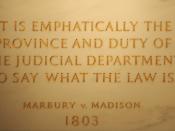Evaluation of Marshall Throughout history, Supreme Court decisions they been evaluated, criticized and praised for their thoughtfulness and consideration of the original document and the framers' intent. As history progresses and the gap between today and the convention widens, justices turn to historical documents and precedents to keep in contact with framers' intent. The fourth Chief Justice that was very in touch with the framers was Chief Justice John Marshall. He broke ground in the judicial branch of government.
Justice Marshall wrote opinions for precedent-setting cases such as Marbury v. Madison(1803) and McCulloch v. Maryland(1819). Both of these cases were significant cases in the growth of the nation and nation-state relations.
Marshall was well educated for his time and practiced law. His breadth and knowledge of the law would be useful to him throughout his career. He served as a congressman as well as secretary of state before he became a Supreme Court Justice.
His experience in government made him more than prepared to be a justice, and a powerful one. With all of his knowledge, Marshall also had influences by other politicians and government figures when writing his decisions. Two key political players in early America were Alexander Hamilton and Thomas Jefferson. The new country was still struggling between federalism and states-rights, even after the failed Articles of Confederation, and these two key figures led their respective parties.
In order to understand Marshall's decisions it is necessary to understand Marshall himself.
Chief Justice John Marshall John Marshall was born on September 24, 1755 in Virginia. At twenty he joined the army and was promoted to captain by 1778. He then retired from active service in December of 1779 and enrolled in the College of William & Mary the next January.
He became a lawyer in his home state and...


